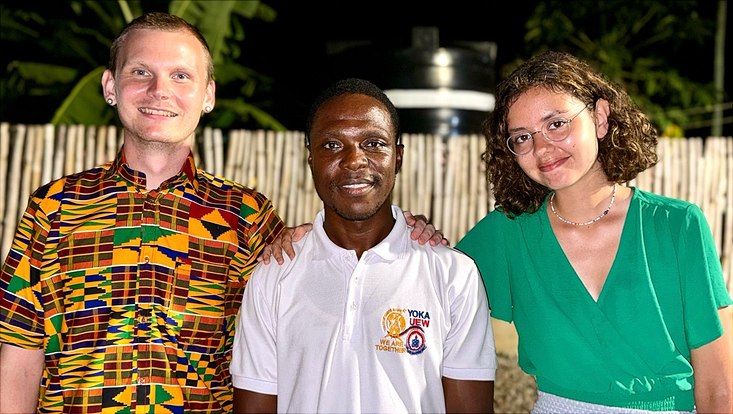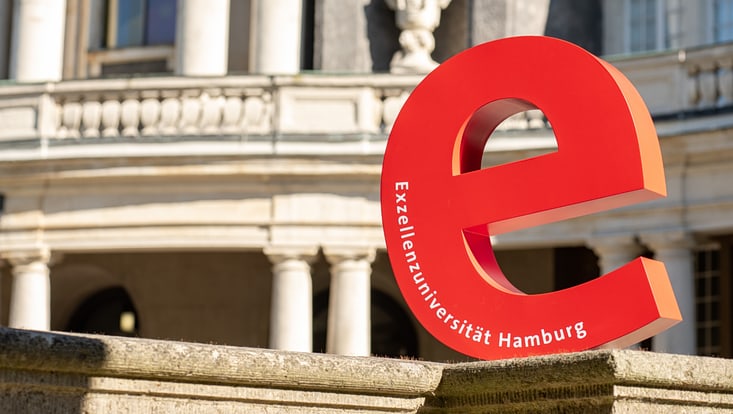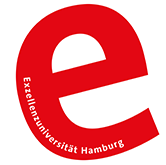International student research projectLessons from History for the Future
5 August 2024, by Lennart Wichmann

Photo: Private
The project Culture of Remembrance—Our History, Our Culture brings together the University of Hamburg and the University of Education in Winneba, Ghana. Six students take a close look at the history of the Schimmelmann family and their involvement in the slave trade. The research project receives funding within the Excellence Strategy of the Federal and State Governments.
How can we contribute to building an inclusive culture of remembrance based on a concrete historical example? Six students, 3 from the University of Education in Winneba, Ghana, and 3 from the University of Hamburg, set out to address this challenge in Summer Semester 2024.
The Hamburg students were inspired by a group of committed volunteers who have long been advocating to establish a place of learning and remembering in the Ahrensburg Castle just outside Hamburg. Until his death in 1782, this castle belonged to the slave trader Heinrich Carl von Schimmelmann. The lack of historical awareness and the lack of a culture of remembrance about this period brought about the idea for Culture of Remembrance—Our History, Our Culture.
International cooperation
Schimmelmann worked very closely with the former King of Denmark and Norway, Christian VII, who traded slaves in the region where Ghana is today. The University’s Faculty of Education cooperates with the University of Education in Winneba, (UEW), Ghana, on various exchange projects. “We are all training to become teachers. Within this format, Isabel Vonessen Wilson and I did internships at Ghanaian schools and got in touch with local teacher-training students and their Faculty,” says Felix Hansen. He is part of the Hamburg section of the group with Isabel Vonessen Wilson and Svea Gaebler. They quickly found 3 Ghanaian students who wanted to join the research project.
The team has since been meeting every Monday to reflect and discuss their own work and progress. With the active participation of various partners from the practice of remembrance, the students are looking for the Schimmelmann’s traces in Hamburg, Ahrensburg, and Ghana. They are also developing conceptual ideas for places of remembrance.
Project mentor Prof. Dr. Telse Iwers from the University of Hamburg and supervisors Prof. Dr. Anitha Oforiwah Adu-Boahen and Prof. Dr. Dandy Dampson from UEW log in regularly as well. The project is to result in a booklet, which will hopefully be understood as a ”contribution to the current discourse on the future of postcolonial thought,” says Svea Gaebler. It will depict various individual perspectives to cover “the most extensive range of opinions, perspectives, and facts” about its history. In their academic work, the students are guided by the ‘Sankofa’ principle, a western African symbol for remembering the past to make positive progress in the future.
Directly providing practical advice
Besides intercultural and international cooperation, the project group places particular value on investigating a socially relevant topic by applying the Service Learning concept, including a reflection of the students’ different disciplines and backgrounds. This approach, which means ‘learning by doing’ in German, is not just about learning with predefined theoretical material, but also about applying knowledge directly in practice and contributing to the common good though cooperation on concrete projects. However, it is also a method to expand your skills and foster critically reflective thinking for your personal growth. Gaebler underlines, that learning and the “exchange of thoughts and ideas about ethical and moral notions,” make working on this team all worthwhile.
New student research groups wanted!
Students who would like to independently conduct their own research project can submit their ideas until 15 August for the current for call for applications. Here is a piece of advice from Svea Gaebler for future applicants: “It is essential that you are passionate about your project, have courage and a love for academic research.” You also need to find a mentor who shares your passion for the research area and wants to act as supervisor.
More information about the funding program
Via this funding program, Universität Hamburg—University of Excellence enables student research groups to assume responsibility for their own academic project. The program calls for applications twice annually and offers a total of €10,000 per project. See the funding pages for more information.



